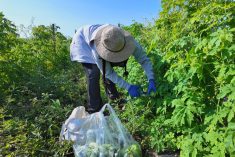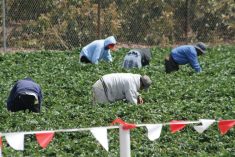Temporary foreign workers and their families can apply to the Agri-Food Immigration Pilot until May 2025 to get permanent Canadian residency.
Sean Fraser, federal minister of immigration, refugees and citizenship, recently announced a two-year extension to the program.
“Our farmers and food processors depend on the steady arrival of foreign workers so that planting, harvesting and food processing activities can take place throughout the year,” said Fraser.
Read Also

Canada seventh-most influential country on agri-food
Report from Dalhousie University and MNP shows Canada ranks seventh among G20 countries on agri-food influence.
Why it matters: The federal government launched the pilot in May 2020 to support labour market needs in the agri-food sector and strengthen Canada’s food supply system.
The program creates a residency pathway for temporary foreign workers (TFWs) employed in meat packing plants or retail butcher shops, livestock and mushroom farms and greenhouses.
“The agri-food pilot is a concrete action that expands immigration pathways for experienced workers and addresses ongoing agricultural labour challenges,” said parliamentary secretary Francis Drouin, in a May 8 news release. “It also supports Canada’s commitment to helping our sector reach its full potential.”
Ryan Koeslag, Mushrooms Canada executive director, said in the same release that farm workers contribute to Canadian communities and the economy.
“We are happy to welcome our farmer’s workers permanently so our workers can fulfil their dreams and support their families.”
The mushroom sector has a 12 per cent job vacancy rate, and while Canadians fill 70 per cent of positions, it relies rely on temporary foreign workers for the balance.
“Currently, we have over 150 of our TFWs who have applied to the agri-food pilot, and we anticipate a lot more will now be eligible,” Koeslag said. “We look forward to continuing to work with the government of Canada, so the program makes sense for our farm workers and employers.”
In June 2022, Migrant Workers Alliance for Change surveyed thousands of farm workers to highlight the program’s shortcomings and ask for a replacement, said Syed Hussan, the group’s executive director.
“Over the last three years, barely a few hundred people have applied to this program because the program is designed in such a way that most people can’t apply,” Hussan told Farmtario. “It should not be extended; there’s nothing to learn from here.”
He said the federal government wouldn’t provide data on total submissions over three years or indicate how many applications were successful.
The program also excludes seasonal farm workers, who account for the majority of farm workers, Hussan said.
“It’s actually given a new tool of exploitation and coercion to employers. As a result, most workers don’t apply,” he said. “Also, the program requires workers to pass an English language test. These tests are done mostly in person (in a city centre).”
Hussan said securing time off to travel from a rural community to the test site is only possible for some candidates, as is providing the required employer promissory letter.
Fraser said the program removed annual occupational caps that limited the number of candidates who could apply for a specific occupation. This was done to increase eligibility and applications.
In addition, the immigration department has a multi-staged plan to introduce changes to the program. It includes expansion of access to open work permits access to participants’ family members regardless of the candidate’s job skill level.
Additionally, unions can attest to a candidate’s work experience in place of an employer’s reference letter, and the program will accept work experience gained under an open work permit for vulnerable workers to give more people an opportunity to qualify.
Applicants residing in Canada can either meet the job offer requirement, including the median wage, or the education requirement, including verification of credentials.
Fraser said these changes will help meet employers’ labour market needs, provide broader support, reduce barriers and expand pathways to permanent residency for applicants and their family members.
“We have fought hard for migrant workers, asking the government to create more opportunities for permanent residency for migrants, especially for low-wage migrants, so they can have and exercise their full human and labour rights in Canadian society,” said Bea Bruske, Canadian Labour Congress president, in the release.
“The promise of changes to the pilot recognizes the role of unions and is a good step forward.”















